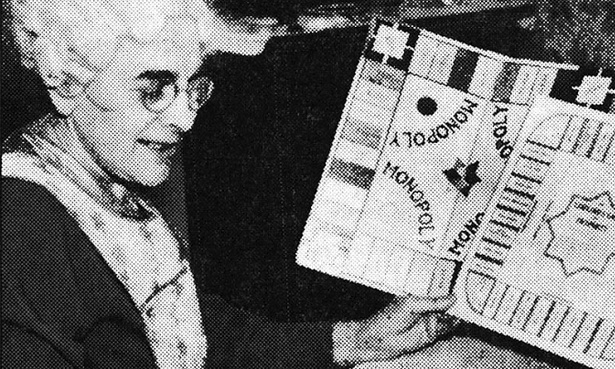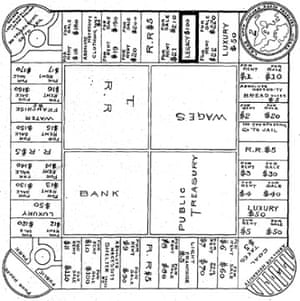The #secret history of #Monopoly: the capitalist board game’s leftwing origins [#geekgirl]

One night in late 1932, a Philadelphia businessman named Charles Todd and his wife, Olive, introduced their friends Charles and Esther Darrow to a real-estate board game they had recently learned. As the two couples sat around the board, enthusiastically rolling the dice, buying up properties and moving their tokens around, the Todds were pleased to note that the Darrows liked the game. In fact, they were so taken with it that Charles Todd made them a set of their own, and began teaching them some of the more advanced rules. The game didn’t have an official name: it wasn’t sold in a box, but passed from friend to friend. But everybody called it ‘the monopoly game’.
Together with other friends, they played many times. One day, despite all of his exposure to the game, Darrow – who was unemployed, and desperate for money to support his family – asked Charles Todd for a written copy of the rules. Todd was slightly perplexed, as he had never written them up. Nor did it appear that written rules existed elsewhere.
In fact, the rules to the game had been invented in Washington DC in 1903 by a bold, progressive woman named Elizabeth Magie. But her place in the game’s folk history was lost for decades and ceded to the man who had picked it up at his friend’s house: Charles Darrow. Today, Magie’s story can be told in full. But even though much of the story has been around for 40 years, the Charles Darrow myth persists as an inspirational parable of American #innovation – thanks in no small part to Monopoly’s publisher and the man himself. After he sold a version of the game to Parker Brothers and it became a phenomenal success, eventually making him millions, one journalist after another asked him how he had managed to invent Monopoly out of thin air – a seeming sleight of hand that had brought joy into so many households. “It’s a freak,” Darrow told the Germantown Bulletin, a Philadelphia paper. “Entirely unexpected and illogical.”

Magie’s original board design for the Landlord’s Game, which she patented in 1903. Photograph: United States Patent and Trademark Office.
To Elizabeth Magie, known to her friends as Lizzie, the problems of the new century were so vast, the income inequalities so massive and the monopolists so mighty that it seemed impossible that an unknown woman working as a stenographer stood a chance at easing society’s ills with something as trivial as a board game. But she had to try.
Night after night, after her work at her office was done, Lizzie sat in her home, drawing and redrawing, thinking and rethinking. It was the early 1900s, and she wanted her board game to reflect her progressive political views – that was the whole point of it.
Source and full story: The Guardian
